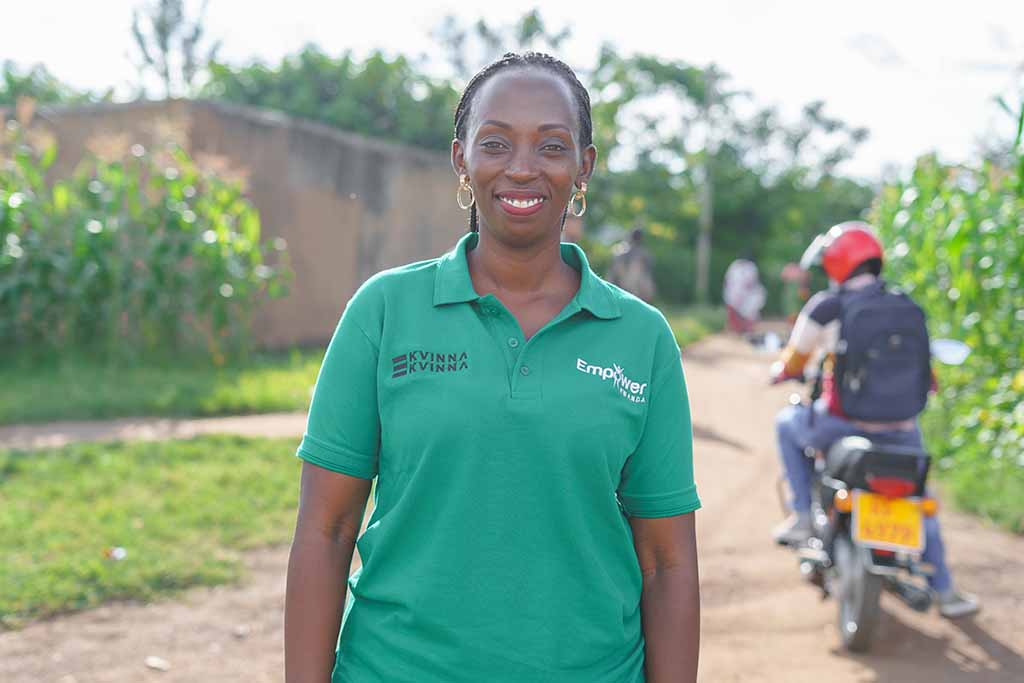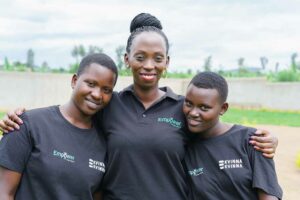“You don’t have to die in an abusive relationship”
In her darkest hour, Olivia Promise Kabatesi decided to stand up for herself and other women and girls who had been abused. She went from struggling to put food on the table to founding a human rights organisation. Today, she is helping hundreds of teenage mothers regain their lives.

Some people have a certain aura of warmth and determination about them. Like they could move mountains. Olivia Promise Kabatesi is certainly one of them. Today, she runs one of Kvinna till Kvinna’s partner organisations in Rwanda. This is the story of how she came to dedicate her life to supporting young women.
Growing up without parents
When she was only three years old, Olivia’s father passed away.
“I had to watch my mother struggle to put food on the table—which is what happens in a system where a man is everything at home, the breadwinner, and the wife is supposed to bear children and do domestic work, things that aren’t income generating,” says Olivia.
Olivia’s mother was determined that Olivia should go to school, even though she couldn’t afford it on her own. Therefore, at the age of six, Olivia had to move to her uncle in Uganda. She stayed there until she graduated.
“Daughters weren’t valued”
Olivia was dedicated to her education. If she could finish school, she could find work and then she was sure she’d be able to make it in life.
“On my father’s side of the family, daughters weren’t valued. They were to be married off for dowry. But thanks to my mother and uncle, I was able to finish school,” says Olivia.
After university, however, she felt like she ought to get married.
“You are really taught that you need a man in your life in order to be happy,” says Olivia.
Emotional abuse
22 years old and fresh out of university, Olivia had high hopes for the marriage and the home the couple was about to create. But her dream was quickly shattered. Olivia’s husband felt threatened by her independence and abused her emotionally for years.
“Emotional abuse is hard to explain. Someone makes you feel inferior, useless—like you’re worthless. It was very hard to go through,” says Olivia.
She draws a breath before continuing:
“It got to a point when I had this moment, looking at my life from the outside: being both mother and father, raising my kids alone, supporting myself,” she says, her voice breaking a little. “I realised I was living the life my mother lived, even though my husband was very much alive.”
Left alone without money
It all came to a breaking point when Olivia was offered an international position for work and her husband suddenly refused to let her bring their three little children. Olivia, who had already resigned from her former job and now had to turn down the new opportunity, was left without an income. Her husband abandoned the family.
Finally, Olivia decided that it had to end and filed for a divorce. For two years, she struggled to find new work and couldn’t afford to send her children to school.
Wanting to empower
It was when she was at this lowest point that Olivia decided to do something radical: start her own organisation.
“I wanted to empower women and girls in the same state as me—young mothers abandoned by their partners and children left without their fathers. I wanted young mothers to believe in themselves. That they can live on their own, they don’t need to be dependent on anybody else,” says Olivia.
“But also, to be able to speak out against oppression. This culture of silence that we have kept me in an abusive relationship for eight years.”
Empower Rwanda
Olivia’s organisation “Empower Rwanda” was founded in 2019. In 2021, they initiated the programme “Her Voice, Her Right” with the support of Kvinna till Kvinna. The goal is to reach a total of 400 teenage mothers in Gatsibo and Nyagatare districts to strengthen their sexual and reproductive health and rights and to protect them from further gender-based violence.
The programme is aimed at teenage mothers from some of the poorest families in the country. To ensure the young mothers and their children receive the support they have the right to, Empower Rwanda collaborates with health care institutions in Rwanda as well as the Rwanda Investigation Bureau (the institution responsible for investigating crimes).

Olivia Promise Kabatesi (middle) together with two of the girls in Empower Rwanda’s programme: Lea (left) who is 18 and Honorine (right) who is 17. Photo: Gloria Powell
“When girls are taught how to claim their own rights, as well as those of their children, and they can do it with confidence—then the abuse is reduced,” Olivia explains.
Apart from access to health care and justice services, young mothers can find a safe environment to receive emotional support which many don’t get at home. On the contrary, many girls are thrown out of their parents’ house when they learn they are pregnant. Those are the girls Empower Rwanda wants to reach and support.
“I see myself in these young mothers. I get them, I believe them. Because I’ve lived the life they are living—abused, without support and without faith in yourself. The difference was that I was an adult when this happened, these girls are only children and many of them haven’t entered relationships voluntarily, they have been raped,” says Olivia.
The support of Kvinna till Kvinna
The Kvinna till Kvinna Foundation was the first donor to grant Empower Rwanda support. Since then, they have been able to secure three other financial partners. They have also been able to grow—Empower Rwanda now has five employees.
“Kvinna till Kvinna has been an important partner for us in helping us build the organisation,” says Olivia who is grateful for the trust in her work.
“It’s not about how long you have been on the ground, what matters is how committed you are to your own vision. I’m not working for anyone else’s vision and I’m not doing it for money. I’m doing it to make a difference. So that, when I’m no longer here, my children will not face the same violence I faced. That no woman or girl will live the life I lived,” she says.
“Going through the divorce was very difficult, but I did it. And I can sit down now with young women and tell them that they, too, can get out. That you don’t have to die in an abusive relationship. You have the right to decide over your own life.”
Kvinna till Kvinna has supported women’s rights in Rwanda since 2017. Since June 2021, we have supported Empower Rwanda in a project called ”Her Voice, Her Right”. Through this, Empower Rwanda reaches 400 teen mothers in Gatsibo and Nyagatare districts, among the poorest in the population of Rwanda.